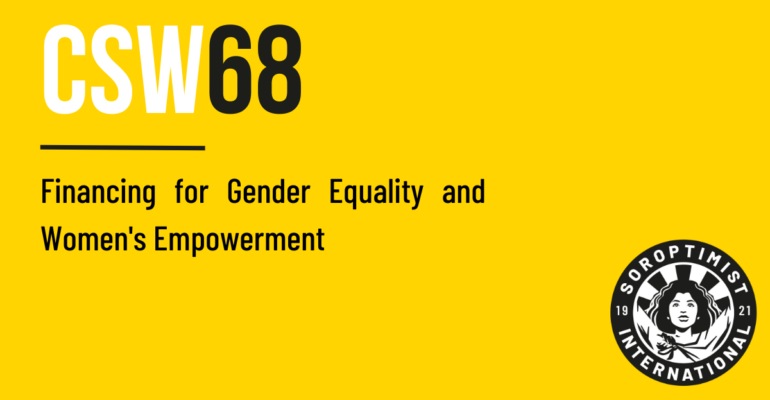This article examines key insights from a recent side event held by the Permanent Mission of India during the Sixty-Eighth Session of the UN Commission on the Status of Women (CSW68) last week. Crafted by Soroptimist International’s Advocacy Policy Advisor, Hana Smith, who attended the event, in collaboration with the Advocacy and Communications Coordinator, Joseph Mason, the article delves into crucial questions surrounding financial inclusion and women’s empowerment. From strategies to increase access to gender-responsive finances to the role of men in empowering women, each section provides valuable insights and actionable recommendations for advancing gender equality in economic opportunities.
How can the public and private sectors increase availability and access to gender responsive finances?
One pressing question raised during this side event addressed the crucial link between financial inclusion and women’s empowerment.
One of the panellists emphasised the significance of both public and private sectors in enhancing access to gender-responsive finances for women entrepreneurs. Drawing from examples such as the use of gendered bank accounts in India, it was highlighted that women must not only gain access to financial resources, but they must also be able to assert control over their finances.
Integral to this process is the active involvement of women in the development of financial products, ensuring their voices are heard and their needs are addressed. Moreover, emphasising security measures, such as biometrics and Personal Identification Numbers (PINs), offer a means to effectively safeguard financial autonomy once achieved. Also established was the importance of developing collaborative solutions that acknowledge the value of women-led development outcomes; where private capital and government policies are concerned, the inclusion of all women not only serves to address poverty, but also to advance prosperity.
What should governments and private sectors consider investing in to address the economic and financial exclusion of women?
Considering the barriers hindering women’s economic and financial inclusion, this question prompted insights into necessary investments from both governments and private sectors. One important avenue highlighted was the transition from cash to digital payments, advocated by initiatives such as the ‘Better than Cash Alliance’, represented by Tidhar Wald, which aims to improve transparency, efficiency, and security while expanding financial inclusion.
With a staggering one billion people excluded from the formal financial sector, a majority of whom are women, urgent measures need to be proposed and explored. Thus far, such measures have included the need to legislate against discrimination regarding women’s access to finance, as evidenced by the pressing reality that only 13 countries are able to boast complete equality in this regard. Ensuring women’s access to digital identification systems was also underscored as an essential move forward.
From the private sector’s standpoint, a holistic approach to the economy was urged, with an emphasis on not overlooking the potential of the 51% female demographic. Suggestions included digitising wages and designing affordable financial products that put women at the centre.
Including young women in policy making for financial inclusion
One notable approach to financial inclusion for young women, was the importance of early education and empowerment. By providing opportunities for young girls, including those who may not have access to formal schooling, avenues for involvement in policy discussions can be widened. An illustrative example was shared, focusing on initiatives working directly with young girls in high school who face educational barriers.
Additionally, it was emphasised that extending education for all women and girls to tertiary levels plays a pivotal role in enabling their participation and empowerment in financial inclusion efforts. Recognising education as a catalyst for both individual empowerment and broader societal progress in this can foster a more inclusive and equitable approach to policymaking.
The role of men in women’s empowerment
Rounding up this side event was a discussion on the role that men can play in empowering women to access economic opportunities – several specific and actionable steps toward fostering inclusivity and equality were explored.
One key recommendation emphasised the need for men and boys to actively advocate for the elimination of discrimination against women, both in policy and practice. This entails not only challenging existing biases but also actively promoting gender equality within their spheres of influence.
Additionally, it was underscored that prioritising women in the design and implementation of products and initiatives is essential for ensuring their meaningful inclusion and participation; such interventions can help to overcome the lack of inclusive financial products designed with only men, rather than men and women, in mind.
Furthermore, a call to action was made for men to actively create space for women in male-dominated environments, recognising the importance of actively dismantling barriers to women’s advancement. These insights underscore the importance of collaborative efforts in driving meaningful progress towards gender equality and economic empowerment.
Conclusion
The insights shared during this event highlight the imperative of collaborative action and inclusive policies to drive meaningful progress towards gender equality in financial inclusion and economic empowerment, underscoring the need for concerted efforts across sectors and stakeholders to effect lasting change.

